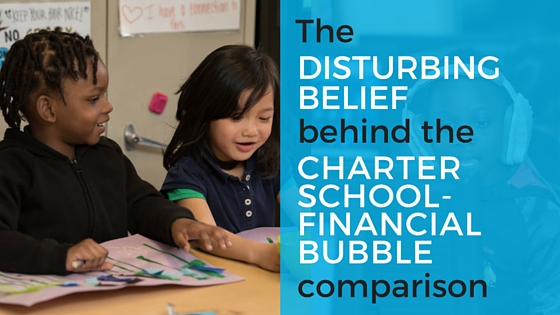Is it worth your time to consider the argument behind a new report that contrasts school choice with the subprime mortgage bubble? Yes, but dig beyond its face to the deeper ideology at its core.
A new front has opened in the education reform wars and if you are reading this, you should decide which side you are on.
Opponents of charter schools have begun to argue that the growth of charter schools shares characteristics with the growth of the housing bubble that collapsed in 2008. Just as the housing bubble ultimately burst, causing harm to many homeowners and to the economy, we are asked to believe that the growth of charter schools will also collapse and harm children and the general public.
The foundation text for this argument is a 28-page paper written by four professors. The paper provides a high-level summary of changes in mortgage lending practices, dating back to the 1970s, and compares those changes to certain claims about the attributes of charter schools. The four authors are professors of education, not finance or economics. The paper itself is heavily footnoted, not with reference to empirical research, but with references to newspaper columnists and bloggers. Those same columnists and bloggers are now promoting the paper as credible research, in a less than virtuous circle.
I found the charter school – housing bubble analogy to be incredibly thin and I do not believe it is terribly worth the reader’s time to contemplate. There are simply too many characteristics of these two phenomena that do not line up.
What is worth your time to contemplate is the belief that is at the core of the authors’ argument: African-American parents who enroll their children in charter schools do not understand what is best for their children and must be protected from themselves.
This central philosophy of the paper is patronizing, at best, or racist, at worst. Repeatedly, the authors assert that African-American families are enrolling their children in charter schools because of a “herd mentality.” Their words, not mine. We are told that African-American parents are being tricked into enrolling their children in schools that are not in their interests and that they only do so because other people are doing so. They just don’t know any better and when they finally figure out that they have been tricked, they will flee charter schools en masse, causing a collapse.
This is yet another in a long history of deficit, rather than asset-based attitudes toward the education of poor communities and communities of color. The latest example, until now, was Justice Scalia’s comments that black students would be better off attending lesser colleges that do not push them ahead too fast.
The analogy to housing is particularly troubling because the authors suggest that the cause of the housing bubble can be traced to changes in laws and lending practices that were designed to overcome redlining, introduce more competition in the mortgage industry and make home ownership a reality for more African-Americans. The authors imply that our nation would be better off if those changes had never occurred. And that we would be better off if the growth of charter schools were also halted.
You may decide otherwise, but as troubling as I find this argument to be, I actually do not believe it is racist. Rather, it is simply another example of a patronizing philosophy toward poor, black and brown families that pervades too much of our public education system, from colleges of education, to school district central offices to education bloggers. Time and again we are told to believe that poor children cannot do well in school because they are poor. We are told that poor children should be assigned to neighborhood schools because their parents cannot be trusted to choose a school. We are asked to believe that the poor need education professors and central office administrators to determine what is best for them.
I land in a different spot. I believe that all children and families are better off when parents are able make choices that best meet the needs and interests of their children.
You are likely to hear the charter school – housing bubble analogy again in the future. Each time you hear it, remember that it is fundamentally an argument that poor, black and brown families cannot be trusted to make their own decisions. Ask yourself if you believe it.



